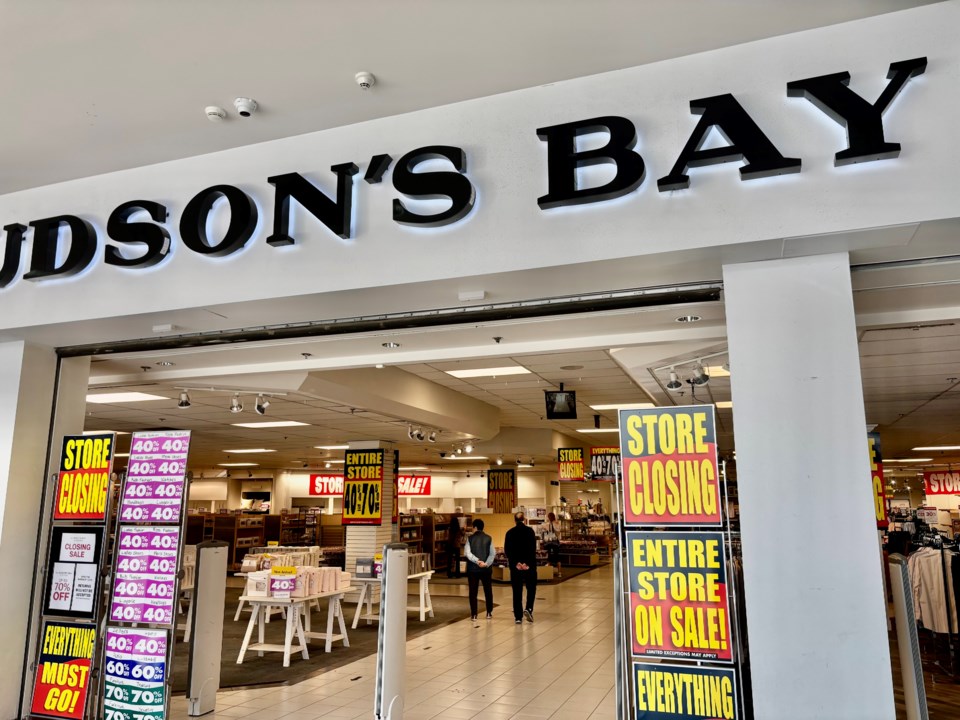The collapse of Hudson’s Bay Co. (HBC) has raised larger questions about the future of retail real estate in B.C.
Experts say HBC’s demise may be a harbinger for traditional department stores in Canada, though retail could rebound with a “Buy Canadian” movement, cashier-less technology, new market entrants and evolving consumer behaviours.
Amid the disruption, retail real estate remains important, said David Ian Gray, principal of Port Moody-based retail consultancy DIG360 Consulting Ltd.
“The idea that the store is dead is totally nonsensical. There are always going to be exceptions, but generally speaking in retail, the store is incredibly important for sales [and] it remains so,” he said.
Still, HBC was too fixated on its real estate holdings at the expense of innovation, Gray said.
“The ownership of Hudson’s Bay Company, and many other malls, were not retailers. They were very savvy real estate investors whose unstated mission was really to extend the life of some real estate holdings as long as possible,” he said.
By embracing entrepreneurial thinking, Gray said B.C. retailers can attract more foot traffic, helping their stores remain a key part of the customer journey. This means taking risks, and integrating physical and digital platforms.
“We always want to talk about online versus offline, but we have to rethink that,” he said.
“The data confirms repeatedly that your best shoppers, … after they get to know you, they’re buying from you across all channels.”

Industry outsiders could bring new thinking
Last month, billionaire B.C. mall owner Weihong (Ruby) Liu signed a deal with HBC to acquire up to 28 store leases. Originally from China, she already owns three B.C. malls including Tsawwassen Mills, which opened in 2016 on First Nation land near Delta. She has a winning formula there, says one expert.
Whether it’s special events, the FlyO’Land indoor playground, a 5D theatre or electric plush animals that kids can drive, Tsawwassen Mills is attracting families from across the region, said retail consultant Craig Patterson, owner of Retail Insider Media Ltd.
“These experiences that we saw at Tsawwassen Mills I think have been incredible. The shopping centre has seen a pretty sizable increase in foot traffic since they introduced those interesting new elements to it,” he said.
If Liu’s deal is approved by HBC’s former landlords and the court, Patterson said she could bring a more experiential concept to former Bay stores in Ontario, Alberta and B.C.
In the meantime, B.C. retailers are trying new things. Last month, Vancouver-based Aritzia LP opened the first A-OK cafe in B.C. at its Guildford Town Centre boutique, serving in-store beverages and pastries. Meanwhile, North Vancouver's Arc’teryx is emphasizing sustainability with a merchandise repair program, Patterson said.
More change in local retail is on the horizon, with Vancouver’s Mountain Equipment Co. recently acquired by Canadian investors, Cadillac Fairview Corp.’s former Nordstrom-leased location in CF Pacific Centre slated for redevelopment and the forthcoming Oakridge Park joint venture by QuadReal Property Group LP and Westbank Corp. expected to open this year.
More changes facing in-person retail
Amazon.com Inc. has been closing its cashier-less check-out Go stores in the U.S. and the U.K., but the tech-powered retail revolution continues.
Toronto-based Aisle 24 opened its first unattended 24-7 market in Vancouver last month on Robson Street.
And according to Gray, retail-related scale for Amazon — which he says appears “very committed” to its physical grocery stores through Whole Foods — could come from selling their technology to other operators.
“Airports should be a great place for it, where you’re kind of rushing for your flight and you don’t want to stand in line. It’s a situational tool, but we’re seeing it show up beyond Amazon,” Gray said.
Some B.C. brands, such as Vancouver-based Lululemon Athletica Inc., Vessi Footwear Ltd. and DUER, are opening new brick-and-mortar locations to fuel growth, after hitting plateaus in online growth, he added.
Other retailers are also fine-tuning campaigns and promotions to take advantage of “Buy Canadian” appeals and sentiments amid U.S.-Canada trade issues.
“Buy Canadian as a movement has not helped everyone, but it certainly helped those that have an overweighting on Canadian product or they’re a Canadian homegrown brand,” Gray said.
Retail real estate in the region is performing well with low vacancy, consistent cap rates, suburban strength and steady cash flow, making it an attractive asset class in today’s market, said Vincent Minichiello, Vancouver-based senior vice-president with CBRE Ltd.
“Almost all investors are now seeking to place capital in retail across the Lower Mainland and looking to expand that throughout B.C. and Western Canada right now,” he said.
This is in part because retail passed the test of COVID-19 with flying colours.
“Retail experienced perhaps the largest and most extensive stress test of any asset class that we’ll experience in our lifetime. It was quite resilient through that whole exercise,” Minichiello said.
Craig Haziza, Vancouver-based vice-president of retail with Cushman & Wakefield Inc., said there will always be demand for physical retail and the services and experiences it affords.
Shopping centres with grocery, drug and financial services remain very much in demand, and new retail offerings are increasingly part of mixed-use developments, he added.
Retail development is expected to continue as the sector navigates an ever-changing world.
“We’re going to see old retailing formats like The Bay either completely shut down or modify to be a little bit more modern,” Haziza said.



